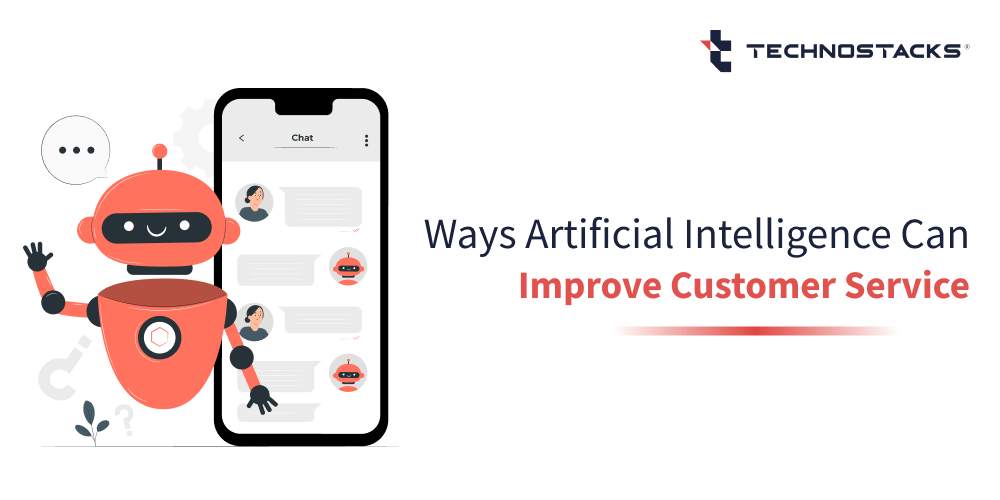Ways Artificial Intelligence Can Improve Customer Service
How do businesses upsurge their customer services while dealing with costs in a world of dipping customer loyalty and rigid digital competition? Modern technologies can assist in several ways businesses can use AI in customer services.
As technology advances, so does the capability to leverage AI to enhance customer services. AI offers an in-depth understanding of your customer demands, enabling you to craft highly customized tech solutions and personalized services.
Organizations exploring to improve their tactics and steer customer interactions must comprehend the approaches in which AI can enhance customer service experiences. There are many approaches in AI technology such as chatbots, AI voice assistance, process automation, and predictive analytics in which you can use AI to improve customer services.
As per the report by HubSpot, 79% of customer service professionals say that they are using AI tools for their daily business operations and it is essential for improving customer experiences.
Also, a Capgemini report says that 63% of retail businesses already using generative AI to enhance their customer services. Thus there is no doubt that AI will boom the customer service market in upcoming years.
In this blog post, we will discuss the significant benefits of AI in customer service and how AI can help to improve customer support solutions.
Ways Businesses Can Use AI In Customer Service
Let us explore in detail the ways AI can help in customer services and the most popular application of AI.
1) AI-Powered Chatbots
Chatbots have become a vital tool for businesses exploring to offer swift customer support 24/7. Artificial Intelligence (AI) enables chatbots to deal with customer queries, offer related information, and direct clients to the fitting resources. With chatbots, you can enhance your customer services and client experience, trim response rates, and reduce costs.
AI-powered chatbots can manage product insights, order status, and track services. They can also help with more intricate queries and deal with numerous conversations at the same time, making it simpler to handle business inquiries.
With chatbots, organizations can offer 24/7 support, enabling customers to receive quick responses irrespective of the time of day. This can enhance client fulfillment, as customers do not have to wait for more time to get answers to their questions.
The companies can manage repetitive activities, freeing up human resources to concentrate on more in-depth queries. They help with cost savings by automating activities, and you can diminish the requirement for human agents for customer services.
Another advantage of chatbots is their capacity to gather customer data and offer insights. Chatbots can accumulate data on user preferences, FAQs, and purchasing behavior, which can be leveraged to enhance digital marketing strategies and client experiences.
Read More:- How Chatbots Are Transforming The Automotive Industry?
2) Predictive Analytics and AI-Powered Insights
Predictive analytics is the usage of AI-enabled algorithms to analyze client data sets and spot patterns better. These trends assist businesses in getting ahead with precise customer demands and user preferences. By using predictive analytics and AI-powered insights, you can enhance client behavior and boost customer retention.
AI-powered predictive analytics can better analyze customer demographics, transaction history, user base behavior, and social media activities. Businesses can spot trends with these data patterns and insights that can assist in anticipating market needs and industry preferences.
By analyzing consumer data sets, you can find consumers who are likely to leave and take hands-on actions to retain them. By anticipating client demands, you can upsurge customer loyalty and repeat purchases. With predictive analytics, organizations can optimize their operational processes to serve their clients.
You can even offer significant insights into product development and digital marketing tactics with predictive analytics. Businesses can spot zones for product advancements by analyzing user data and build targeted campaigns that resonate with their customer base.
Read More:- Ways To benefits Your Business From Artificial Intelligence
3) Voice Assistance and Analysis
Voice-based assistance allows customers to access insights and services easily, making it a fitting and available selection. Voice assistants can be leveraged in a variety of approaches to improve customer experiences. For instance, banks can utilize voice assistants to offer customers quick support and access to account details.
Retailers can leverage it to offer customers product suggestions and custom shopping experiences. Medical providers can utilize a voice assistant to offer patients with health insights and appointment alerts.
Voice assistants can be advantageous for customers who may have disabilities that make it tough to use out-of-date customer support channels.
Voice assistance can swiftly help customers with answers to common queries and problems, dipping wait times and frustration. This can lead to improved user loyalty and repeat purchases.
On the same side, Voice AI has made it simpler to automate call center communications. These AI tools are effectively trained in predictive call routing and engaging voice replies to better serve as the first line of defense for client inquiries.
4) Sentiment Analysis
Sentiment analysis is the procedure of leveraging AI algorithms to analyze client feedback and reviews to gain insights into usage opinions, customer emotions, and attitudes. You can gain valued insights into their experiences and spot enhancement areas by analyzing user sentiment. Sentiment analysis is a robust tool for generating positive customer experience, allowing you to comprehend customer demands and preferences.
AI-powered sentiment analysis can be better utilized to analyze consumer feedback across a series of online and offline channels comprising social media, research surveys, and reviews. By analyzing this response, you can classify areas for development and take action to resolve customer challenges.
Read More:- How to Create AI Software?
5) Augmented Messaging
While chatbots are effective tools for troubleshooting small-sized challenges and issues, most are not ready to resolve complex scenarios.
This is where the augmented messaging tech approach spots openings where human agents should step in and assist the client with further personalization.
While bots are effective tools for saving costs, efforts, and time for your team and your customer base, they will not generate the same end-consumer delight when matched to a human agent. However, you receive the best of both worlds with Augmented messaging tools.
6) Automated Call Transcription Services
Automated call transcription services through AI are transforming customer service by improving call quality assurance using resourceful call reviews and supporting the targeted training of new staff members. It assists in spotting significant service trends and recurrent problems.
These transcriptions provide an objective record for efficient dispute solutions and pave the path for customized customer engagements, ensuring a more personalized and highly responsive service. By using modern-day AI tools, customer service teams can work with sharp competencies and effectiveness to ensure enhanced customer service.
7) Multilingual Assistance and Extended Support
Today, AI chatbots and related tools even have the capability to create content in diverse languages. This is particularly accommodating if your business runs across the world.
AI can spot a client’s language and quickly translate the message prior to it reaching your technical or business support teams.
Your teams can effortlessly review your customer profiles or operate surveys to gain insights into your client’s chosen languages. Then, integrate those into your AI tactics and strategies.
8) Omni-Channel Services and Solutions
AI can back your omnichannel service tactics by assisting you in directing clients to the precise support channels.
If all your chat executives are busy, the AI can tell the client that they should leverage live chat for a faster response.
Or if a client is writing an extremely long query on your email-based form, it can be recommended that they directly call in for more bespoke assistance.
9) Request Routing
Along with outgoing messages, you can even leverage AI to find keywords and analyze the style of the customer request prior to assigning it to one of your executives.
AI tools enable you to analyze the client’s issues, the required urgency, and their connected emotions better and quickly. You can even program your AI solutions to tag the precise customer support agent to manage the case.
This is an effective time-saving procedure that makes it simpler for your customer support team to solve challenges and problems.
Read More:- How Is Machine Learning Used In Finance?
10) Data Management
Not all AI functionalities are directly customer-facing. Some of the most helpful tech tools are the ones that are blended with your inner software solutions.
For instance, AI can be mutually paired with your CRM tool to recall client information for your assigned human service agents. Your client success team can further leverage this functionality to enable customers based on AI-generated insights proactively.
So, you can leverage AI to trace client interaction data. If a loyal client has yet to interact with you in a while, you can craft a systematic AI to flag it and alert your team members to connect with that client.
Benefits of AI in Customer Service
Now, let us look at the gains and benefits of AI in customer service.
- Manage Large Volumes of Data
Artificial intelligence (AI) is the subsequent big thing in customer service, and it is resolving an issue that many organizations face – large volumes of data sets.
- Trim Down Customer Handling Time
When it comes to managing customer queries, most companies need help with scaling up the number of agents to deal with the upsurged customer traffic. However, all customer queries are also required to be attended in a well-organized way.
Using AI, you can streamline these response requirements to happen in a timely manner by enabling automation.
- Determine Customer Expectations Better
One of the prime challenges in customer service is trying to meet progressively high morals and benchmarks of customer satisfaction.
With AI, you can bring personalization to your customer services. It helps you to know better what your customers need, what they like, and what their preferences are.
- Deliver Hands-on and Positive Support
Most customer support software is developed to offer reactive support. They assist customers when they have a challenge or problems. However, AI can resolve customer challenges and problems proactively, offering hands-on support.
- Cut Business and Technology Costs
Almost every leading technology giant is leveraging some AI to deliver enhanced customer services. By enabling a ‘chatbot’ or an automated approach, organizations are already dipping their cost of delivering customer service by up to 80 percent.
Technology Solutions and Business Examples of AI
Let us explore the probable technology solutions, AI for customer services, and business instances of Artificial Intelligence (AI) services.
- Agent Assist
In many advanced omnichannel contact centers, agent assist tech leverages AI to automatically infer what the client is asking, search knowledge blogs, and showcase them on the customer service agent’s screen while they are on the call. The procedure can save time for the agent and the client, and it can reduce average handle time, which lessens cost.
- Self-service
Customer self-service refers to users being able to spot and find the support they require without depending on a customer service agent. Most users, when given the choice, would resolve their challenges on their own if offered the precise AI tools.
As AI has become more progressive, self-service solutions are becoming more pervasive and enable customers to resolve problems on their schedules.
- Robotic process automation
There are number of benefits of Robotic process automation (RPA) for businesses and it can automate mundane activities that an agent used to execute. Automating bots to work on updating data records, handling incidents, or delivering proactive outreach to clients can lessen costs and enhance processing time.
One of the best approaches to determine where RPA can help in customer service is by identifying the procedures that take the lengthiest or have the most clicks amid involved systems.
- Machine learning
In customer services, machine learning (ML) can back agents with precise predictive analytics to spot common queries and responses. The tech can catch stuff an agent may have missed in the conversation.
Also, ML can be leveraged to assist chatbots and other AI tools in adjusting to a given scenario based on earlier outcomes and assist customers in resolving issues by using self-service solutions.
Read More:- How Can Machine Learning Help In the Agriculture Industry?
- Natural language processing
Customer service teams and business applications now leverage natural language processing in their user experience and voice of the client programs. Having the automated system record communications across calls, email, chat, and SMS channels and then offer quick insights helps an agent meet the customer’s demands more easily.
- IVR automation
Although Interactive Voice Response (IVR) systems have enabled the automation of straightforward routing and transactions for a long time now, advanced IVR systems use AI to deal with these activities.
Everything from validating the user base with voice biometrics to telling the IVR system what is required to be executed with the assistance of natural language processing is streamlining the customer experience. Some organizations turn to visual IVR systems through mobile applications to rationalize well-organized menus and involved transactions.
- AI training
As the COVID-19 crisis led company employees into remote positions, several training teams started leveraging AI to craft simulations to test employee skills for managing diverse situations. Earlier, the training involved a mixture of classroom training, self-learning, and a concluding assessment, which was tougher to execute in remote or hybrid office setups.
With AI taking the prime role of the customers, fresh agents can test multiple possible scenarios and practice their replies with natural complements to make sure that they are completely ready to back any challenge a user or customer may have.
Challenges of AI in Customer Service
We explored how to use AI in customer service. However, despite its positive returns, AI also has some problems, challenges, and risks. For illustration, practical AI applications may lack the human touch and compassion to comprehend the user’s emotions or intent and may not be able to reply compassionately.
Besides, they may be incapable of dealing with multifaceted, unclear, or delicate states of affairs, such as grievances, arguments, or crises, and may be required to escalate the problem to a human agent, which can negatively impact client trust, contentment, and loyalty.
In addition, AI chatbots may face technical challenges, like bugs, malfunctions, or lost time, that can disturb the service and irritate the customer. They may also make errors, like offering immaterial insights, mix-up with the customer’s questions, or echoing the same answers, which can harm the chatbot’s trustworthiness and the business’s status.
AI chatbots may raise some moral and lawful questions, such as how to safeguard the user’s privacy and information, how to ensure the chatbot’s transparency and answerability, and how to fulfill the applicable regulations and benchmarks. These challenges must be sensibly considered and handled to evade probable lawsuits, fines, or consequences.
Key Takeaways
By using AI to offer personalized suggestions and experiences to customers, you can boost engagement and client loyalty. AI-powered chatbots can deliver quick support 24/7, trimming the requirement for human customer service professionals and reducing costs.
Predictive data analytics can assist you in dealing with customer demands and choices, leading to augmented customer gratification and retaining. Voice assistants can offer expedient and reachable support for customers, particularly those with disabilities or who choose a more natural approach to engaging with technology.
Furthermore, sentiment analysis can deliver valued data insights into client feedback and user reviews, assisting them in spotting areas for enhancements.
As AI technology continues to advance, you will have even more openings to use AI to modernize customer services and gain an edge in their targeted markets. With precise business strategies and tech, organizations can craft highly customized and unified experiences for their customer base, leading to a boost in customer loyalty, revenue, profitability, and progress.
Technostacks is a leading artificial intelligence app development company that offers numerous digital solutions for global clients. We have a team of experienced and dedicated developers who are able to meet your project requirements. Contact us for your business application development requirements.
FAQs
1) How can AI be used to improve customer service?
AI improves customer services with better personalization, using self-service tech tools, solving problems quicker, trimming down errors, and meeting customer demands. AI even streamlines buying behavior, capitalizes on client analytics, and lessens employee burnout.
2) How can businesses use AI to improve customer service and satisfaction?
Companies can better comprehend and enable customer requirements by using AI to enhance data harvesting. They can even leverage these data insights and analytics to be involved in forecasting, spot emerging growth openings, and become accustomed to their digital marketing strategies to align with ever-changing consumer choices.
3) Why use AI in customer service?
Modern consumers progressively want swift and fitting services. Using AI to offer frictionless self-service through bots and other automated channels is a win for clients and human agents. It delivers quicker, more effective customer services while even eliminating much of the monotony for agents.
4) How can AI help in customer support?
AI tools lessen response times by automating routine procedures, such as answering common FAQs or processing straightforward activities, by applying chatbots and AI assistants. As an outcome, customer support offers quick assistance, leading to boost gratification.
5) What are the examples of AI in customer service?
Some examples of AI and automation in customer services comprise chatbots, natural language processing, interactive voice response (IVR), and smart virtual assistants.
6) What is the role of artificial Intelligence in customer service?
By automating monotonous tasks, AI eases the load on your team, letting them emphasize more multifaceted problems. AI also aids staff members with customer engagements by providing real-time analytics, insights, and suggestions, leading to swift resolution times and improved performance levels.
7) How to use AI to give the best customer service?
AI tools and solutions enable you to analyze the client’s challenges, the apparent insistence, and their linked emotions. One can program AI models to tag the precise agent to manage the case. This is a time-saving procedure that makes it simpler for your customer services and support team to resolve problems.








